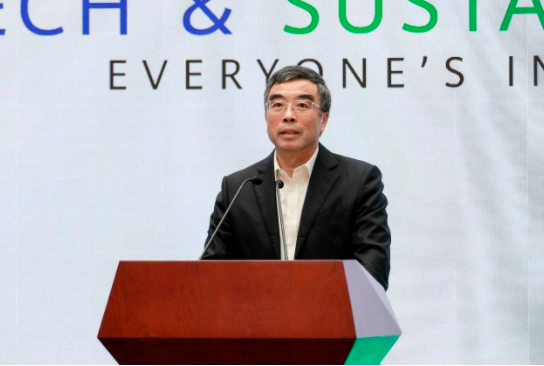Huawei today released its 2020 Sustainability Report. The company has been publishing this annual report for 13 consecutive years. The 2020 report explains the major progress that Huawei has made over the past year in its four strategies for sustainability: digital inclusion, security and trustworthiness, environmental protection, and a healthy and harmonious ecosystem.
TECH4ALL digital inclusion initiative: Leaving no one behind in the digital world
The COVID-19 pandemic has strained global education and healthcare systems in a way that has never been seen before. The company has been using its innovative ICT solutions to provide people across different regions with equal access to quality education and healthcare resources, and playing its part in the fight against the pandemic.
In 2020, Huawei rolled out its Skills on Wheels and Connecting Schools programs in over 200 schools around the world, benefiting more than 60,000 people. Huawei also used ICT solutions to assist the pandemic response in the communities where it operates and provided technical assistance to nearly 90 countries, doing its best to support local communities in this time of great need.
As part of its efforts to provide universal access to digital technologies and applications, Huawei provides 15 accessibility functions on its smartphones. Every month, about 10 million people use these functions that allow them to better enjoy a smart lifestyle.
In 2020, Huawei helped 22 protected areas in 18 countries manage natural resources and protect biodiversity more efficiently using its digital technologies. Huawei also launched the RuralStar Pro solution, which provides voice and mobile broadband services for sparsely populated remote villages. Its RuralStar solutions now provide network coverage for more than 50 million people in remote communities.
Staying people-centric: Building secure, trustworthy, and high-quality products, solutions, and services
"We believe that technology should be people-centric," said Tao Jingwen, a board member and Chairman of the CSD Committee of Huawei, in the report. "Technology should serve people in a manner that fully respects their rights by guaranteeing informed choice and consent."
Huawei treats cyber security and privacy protection as its top priorities. In 2020, Huawei released the Software Process Trustworthiness Capability Framework and Assessment Criteria, establishing a complete set of trustworthy coding production mechanisms. As of the end of 2020, Huawei had been granted 2,963 patents relating to cyber security and privacy protection around the world. Last year, the company signed data processing agreements with more than 5,000 suppliers and performed extensive due diligence to ensure compliance.
Despite the pandemic and being on the Entity List, Huawei continued to ensure the smooth communications of more than three billion people worldwide and support network stability during more than 200 disasters and major incidents.
Tech for a better planet: Powering green and sustainable development with technology
"An intelligent world should be a green world," said Liang Hua, Chairman of Huawei, in the report. "Advances in technology can help us better understand and protect nature, mitigating the impact of human activity on the planet. We believe that technology can work in harmony with nature and help make this world a better place."
As part of its efforts to create a greener and more sustainable digital world, Huawei focuses on cutting carbon emissions, promoting renewable energy, and contributing to a circular economy. In 2020, Huawei's CO2 emissions per million RMB of sales revenue showed a 33.2% reduction compared to the base year (2012), beating the target (30%) the company set in 2016.
In 2020, the global environmental non-profit CDP scored more than 5,800 companies for their efforts to tackle climate change, and Huawei was one of the few companies that were recognized with a prestigious 'A' score for its actions to cut emissions, mitigate climate risks and develop the low-carbon economy.
To promote renewable energy, Huawei has deployed its digital power solutions in more than 170 countries and regions, serving one third of the world's population. To date, these solutions have generated 325 billion kWh of electricity from renewable sources and saved 10 billion kWh of electricity. These efforts have resulted in a reduction of 160 million tons in CO2 emissions.
The company is also using more eco-friendly materials, designing its products for greater longevity, using more sustainable packaging, and reducing waste. Combined, these actions will help promote a circular economy.
Tech for good: Continuing to create social value and driving progress towards the UN SDGs
In addition to creating more business value for its customers, Huawei recognizes the importance of creating social value for all stakeholders and advancing progress towards the UN Sustainable Development Goals (SDGs).
Huawei cares about its employees and puts their safety first. During the COVID-19 pandemic, the company took a number of steps to ensure the health and safety of employees and help suppliers and contractors safely resume work.
In 2020, Huawei organized more than 650 charitable activities around the world. Its flagship CSR program Seeds for the Future has benefited nearly 9,000 students from 130 countries and regions, and these young people will become a valuable talent pool for the ICT industry in the future.
Over the past year, Huawei continued to enhance its compliance program and engaged and collaborated openly and proactively with stakeholders to foster mutual understanding and trust.
In the post-pandemic era, technology is poised to play an even greater role in supporting sustainable social development. Huawei is ready and willing to work with its partners, and use innovative ICT solutions to support progress towards the UN SDGs, and ultimately, to bring digital to every person, home and organization for a fully connected, intelligent world.
The 2020 Sustainability Report can be found at: http://www.huawei.com/en/sustainability/sustainability-report






0 comments: